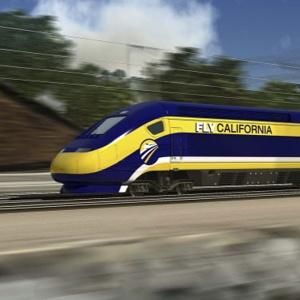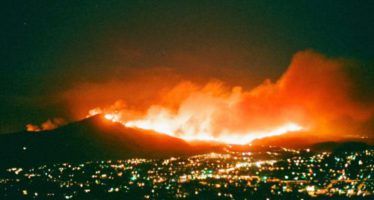Gavin Newsom will face daunting questions on bullet train

When Gavin Newsom is sworn in as California governor on Jan. 7, he’s already indicated he will take criticisms of the state’s troubled $77 billion high-speed rail project seriously.
That’s in sharp contrast to outgoing Gov. Jerry Brown, who described project critics as “declinists” with no vision for what the Golden State could become. Brown only offered vague pronouncements when asked about giant cost overruns and the $50 billion or more gap between available funding and what’s needed to build the high-speed rail linking Los Angeles and San Francisco.
If Newsom lives up to his word, he’s going to need to respond to profound issues raised by project watchers in and out of the state government over the last two months.
In November, state Auditor Elaine Howle issued a harsh report on poor management practices in the California High-Speed Rail Authority, especially the billions in cost overruns due to the decision to launch construction of the project’s $10.6 billion, 119-mile first segment in the Central Valley before the authority was fully ready. Howle’s audit led Newsom to tell a Fresno audience that he might shake up the leadership of the rail authority.
Among the few specifically positive observations that Newsom has made in recent months about the project was that the first segment held promise to link Silicon Valley workers with less expensive housing in the Central Valley.
Project seen as ‘notoriously unpopular’ in Central Valley
But a Dec. 23 Sacramento Bee analysis found that even though the bullet train project was generating thousands of jobs in the agricultural region, it was “notoriously unpopular” among residents.
“They resent how construction has carved up their farms and scrambled their highways,” the Bee reported. “Completion of just a partial segment through the Valley is still years away, and residents doubt the project will ever get finished. They question the promises that high-speed rail will lift the Valley out of its economic doldrums.”
This skepticism is increasingly shared by elected Democrats both in the Central Valley and the rest of the state.
A Dec. 28 Los Angeles Times report quoted Assembly Speaker Anthony Rendon as saying problems with the bullet train are so widespread that it should “be paused for a reassessment.” Rendon said the prospect that the project would run out of money before ever reaching the Los Angeles region left voters in the area feeling deceived.
Assembly Transportation Committee Chairman Jim Frazier, D-Oakley, has made clear that he will work to have rail authority chairman Dan Richard ousted because of cost overruns and management issues.
The bullet train’s image has also deteriorated among state pundits.
When California voters approved $9.95 billion in bond seed money for the then-$45 billion project in 2008, the ballot initiative was broadly supported by newspaper editorial boards.
“Americans who visit Japan or Europe and hop a bullet train get a stunning reminder of how far behind much of the industrialized world we are in swift, clean, efficient transportation,” the San Jose Mercury-News editorial page declared on Oct. 18, 2008. “Californians can change that by approving Proposition 1A, a bond to begin construction of a high-speed rail system that would whisk passengers from Los Angeles to the Bay Area through downtown San Jose in a mere 2 1/2 hours. It will be a catalyst for the economic growth of California and this region over the next 100 years.”
An editorial printed last month in the Mercury-News showed a 180-degree swing in opinion: “The incompetence and irresponsibility at the California High-Speed Rail Authority are staggering. … It’s time to end this fiasco to stop throwing good money after bad.”
Decision on cap-and-trade funding may signal Newsom’s intentions
An early sign of Newsom’s level of enthusiasm for continuing on Brown’s path is likely in coming weeks as initial work is done on the 2019-20 state budget. The California Air Resources Board reported pulling in $813 million from its Nov. 14 auction of cap-and-trade air pollution credits – a heavy haul.
If Newsom opposes diverting 25 percent of cap-and-trade revenue to the bullet-train project – as has been done since 2015 – that will be the clearest indication yet that he is ready to back away from the troubled project.
Chris Reed
Chris Reed is a regular contributor to Cal Watchdog. Reed is an editorial writer for U-T San Diego. Before joining the U-T in July 2005, he was the opinion-page columns editor and wrote the featured weekly Unspin column for The Orange County Register. Reed was on the national board of the Association of Opinion Page Editors from 2003-2005. From 2000 to 2005, Reed made more than 100 appearances as a featured news analyst on Los Angeles-area National Public Radio affiliate KPCC-FM. From 1990 to 1998, Reed was an editor, metro columnist and film critic at the Inland Valley Daily Bulletin in Ontario. Reed has a political science degree from the University of Hawaii (Hilo campus), where he edited the student newspaper, the Vulcan News, his senior year. He is on Twitter: @chrisreed99.
Related Articles
Credit industry circles California pot banking
As Gov. Jerry Brown’s administration turns toward tidying up California’s complex and still-unsettled marijuana laws, the massive market for money
Gov. Newsom pushes for quick action on wildfire plan
Gov. Gavin Newsom wants the Legislature to agree to sweeping reforms in wildfire liability rules by July 12, before lawmakers
Some legislators proudly refuse pay increases
Only in public office could the distinction of lowest paid be worn as a badge of honor. But Richard Roth,




